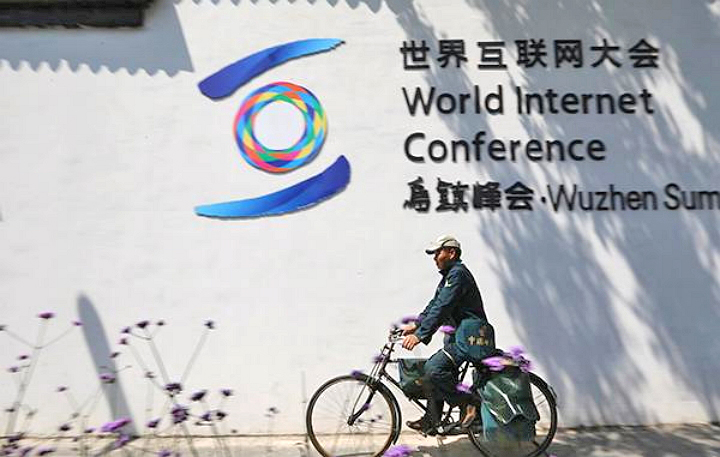Academics probe China’s contribution to global Internet governance

A postman rides past a poster of the third World Internet Conference that was held from Nov. 16 to 18 in Wuzhen, South China’s Zhejiang Province.
Reviewing China’s efforts to improve global Internet governance, scholars said that the nation has not only charted a course for the international community and stakeholders to reach the broadest possible consensus but also provided a feasible path for the future development of the global Internet.
Their remarks came as the third World Internet Conference drew to a close in Wuzhen, South China’s Zhejiang Province on Nov. 18.
At the Global Multi-stakeholder Meeting on the Future of Internet Governance held in late April 2014, China argued that sovereign states are entitled to administer Internet affairs at home, and multilateral mechanisms like the United Nations should play a bigger role in global Internet governance.
“We raise proposals on Internet governance to secure China’s due discourse power rather than to impose our values upon others, still less to seek Internet hegemony,” said Xue Lan, dean of the School of Public Policy and Management at Tsinghua University.
Stressing the importance of China’s voice, Xue said that the world’s largest developing country represents the interests of the majority of developing states, especially emerging economies.
China has proposed to address malpractices on the current international Internet by insisting on Internet sovereignty and opposing network hegemony to promote global Internet governance reform and build a community of common destiny, said Zhi Zhenfeng, a research fellow at the Chinese Academy of Social Sciences.
It is based on the concept of a community of common destiny that China actively participates in the development and governance of global Internet while exploring its own path toward Internet development.
Apart from holding the World Internet Conference, China-ASEAN Information Harbor Forum, and the Online Silk Road Forum of China-Arab States Expo, China has also committed to bridging the digital gap between developed and developing countries. Through such efforts as enhancing the interconnectivity among countries along the “Belt and Road,” it has enabled people around the world to share the dividends brought by Internet development.
Vice-Minister of Industry and Information Technology Chen Zhaoxiong said that jointly building the “Belt and Road” initiative is a major proposal the Chinese governance has put forward to follow the trend of regional and global cooperation and cater to the development needs of regions and countries along the routes.
“China has taken the lead in multiple aspects of Internet development and hammered out a whole set of practice schemes, so it is entirely within its capacity to guide Internet governance by means of its technological clout and advanced notions,” said Zhang Weiwei, director of the China Institute at Fudan University.
In 2010, the Information Office of the State Council published a white paper on the Internet in China, which stipulated clearly: “China regulates the Internet by law, and the Chinese government plays the leading role in Internet administration.”
Policy of this kind was once misunderstood, judged and even criticized by some countries and international organizations. However, the exposure of the US PRISM surveillance system in 2013 raised alarms in the international community about the intrinsic limitations of the existing Internet administration system as well as the necessity and urgency of building a new international governance order. China’s experience and idea on Internet administration have since won increasing recognition.
Now it is widely accepted that China proposal, scheme and practice not only reflect the country’s view of Internet values, but also exemplifies its successful exploration of the cyberspace, providing valuable experience for the world.
David Kurt Herold, a German scholar on the Internet and social development, said that countries around the world are learning from China’s Internet administration method “consciously or unconsciously.”
Many of Chinese concepts are similar to ideas upheld by the international community, and China’s practice is likewise useful to other countries, said Paul Cornish, a professor from the Global Cyber Security Capacity Centre at Oxford University.
Nokia Chairman Risto Siilasmaa expressed the belief at the conference that China will lead innovation and create a future beneficial to all humanity through active collaboration.
This article was translated from Guangming Daily.
